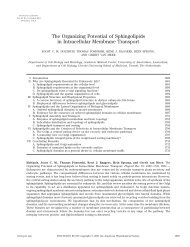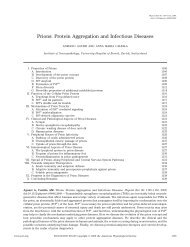Creatine and Creatinine Metabolism - Physiological Reviews
Creatine and Creatinine Metabolism - Physiological Reviews
Creatine and Creatinine Metabolism - Physiological Reviews
Create successful ePaper yourself
Turn your PDF publications into a flip-book with our unique Google optimized e-Paper software.
1180 MARKUS WYSS AND RIMA KADDURAH-DAOUK Volume 80<br />
supplementation at a rate of 0.25 g � (kg body mass) �1<br />
over 5 days significantly improved the 1,000-m performance<br />
of competitive rowers by an average of 2.3 s (823).<br />
Regression analysis revealed a positive relationship of<br />
borderline statistical significance between performance<br />
<strong>and</strong> Cr uptake.<br />
It should not be ignored that some conflicting reports<br />
suggested no improvement in muscle performance with<br />
Cr supplementation (for a review, see Ref. 1106; see also<br />
Refs. 62, 141, 426, 918, 1035). Several explanations can be<br />
put forward for the discrepant findings which, however,<br />
will have to be tested: e.g., too short or too long (possibly<br />
causing downregulation of the Cr transporter) a period of<br />
Cr supplementation, insufficient daily Cr dosage, or a high<br />
proportion of nonresponders among the subjects analyzed.<br />
In the study by Cooke et al. (142), a potentially<br />
favorable effect of oral Cr supplementation on power<br />
output during bicycle ergometry may have been masked<br />
by the high st<strong>and</strong>ard errors of the data. The lack of a<br />
favorable effect of Cr supplementation on supramaximal<br />
running on a motor-driven treadmill for 3–6 min until<br />
exhaustion, in a6kmterrain run (45), in 700-m maximal<br />
running bouts (993) <strong>and</strong> in a series of 1-min supramaximal<br />
cycling bouts (232) may be due to the longer duration of<br />
exercise which inevitably results in a decrease in the<br />
relative contribution of PCr hydrolysis to total work output.<br />
Notably, Cr supplementation even resulted in a significant<br />
increase in the run time for the 6-km terrain run<br />
(45). The absence of a favorable effect of Cr supplementation<br />
on repeated 10-s cycle ergometer sprint performance<br />
(51) or on 60-m sprint performance (798) lacks an<br />
explanation <strong>and</strong> is in direct contrast to the studies that<br />
have shown an ergogenic effect of Cr supplementation in<br />
high-intensity, intermittent exercise (see above).<br />
Inconclusive data have been published on the effect<br />
of Cr supplementation on swimming performance. An<br />
improvement in performance parameters was seen in<br />
some studies (312, 765), but not in others (103, 673, 999).<br />
In the study of Thompson et al. (999) on trained swimmers,<br />
the daily ingestion of only 2gCrfor14days may<br />
have been insufficient to increase the muscle stores of<br />
total Cr. On the other h<strong>and</strong>, the tendency toward worse<br />
25- <strong>and</strong> 50-m performance times of competitive swimmers<br />
after Cr supplementation (20 g/day over 5 days) was<br />
suggested to be due to an increase in hydrodynamic resistance<br />
which is associated with the body weight gain<br />
caused by Cr ingestion (103, 441, 673). In elite competitive<br />
male swimmers, Cr supplementation (9 g/day for 5 days)<br />
had no effect on performance in a single 50-yard sprint<br />
but significantly improved performance in a repeated<br />
sprint set of 8 � 50 yards at intervals of 90 s (765). A study<br />
on junior competitive swimmers performing three 100-m<br />
freestyle sprint swims with 60-s recovery between heats<br />
indicated that Cr supplementation (21 g/day for 9 days)<br />
may improve performance already in heat 1 relative to the<br />
placebo group <strong>and</strong> decreases swim time in heat 2 (312). In<br />
conclusion, the results published so far suggest that Cr<br />
supplementation has either no or even an adverse effect<br />
on single-sprint swim performance but may have a slight,<br />
favorable effect on repetitive swimming performance.<br />
Cr supplementation (20 g/day for 5 days) caused an<br />
acceleration of PCr recovery after intense electrically<br />
evoked isometric contraction of the vastus lateralis muscle<br />
in humans (Fig. 20) (306, 307; see also Refs. 47, 913).<br />
The most pronounced effects were observed in those<br />
subjects in whom Cr supplementation caused the largest<br />
increase in muscle Cr concentration. Both Bogdanis et al.<br />
(75) <strong>and</strong> Trump et al. (1017) demonstrated that PCr resynthesis<br />
during recovery from intense muscular activity<br />
is critical to the restoration of muscle power at the onset<br />
of a next bout of maximal exercise. In a test protocol<br />
consisting of two 30-s cycle ergometer sprints interspersed<br />
with 4 min of recovery, a high correlation was<br />
seen between the percentage of PCr resynthesis <strong>and</strong> the<br />
percentage recovery of power output <strong>and</strong> pedalling speed<br />
during the initial 10 s of sprint 2 (75). Consequently, an<br />
increased rate of PCr recovery after Cr supplementation<br />
FIG. 20. PCr resynthesis (E, F) <strong>and</strong> accompanying decrease in free<br />
Cr concentration (�, ■) in human muscle biopsy samples obtained after<br />
0, 20, 60, <strong>and</strong> 120 s of recovery from intense, electrically evoked isometric<br />
contraction before (E, �) <strong>and</strong> after (F, ■) 5 days of Cr ingestion.<br />
Only subjects with an increase in total Cr concentration in vastus<br />
lateralis muscle of �19 mmol � (kg dry mass) �1 after Cr ingestion demonstrated<br />
an accelerated rate of PCr resynthesis. *P � 0.05. **P � 0.01.<br />
[From Greenhaff et al. (307).]











